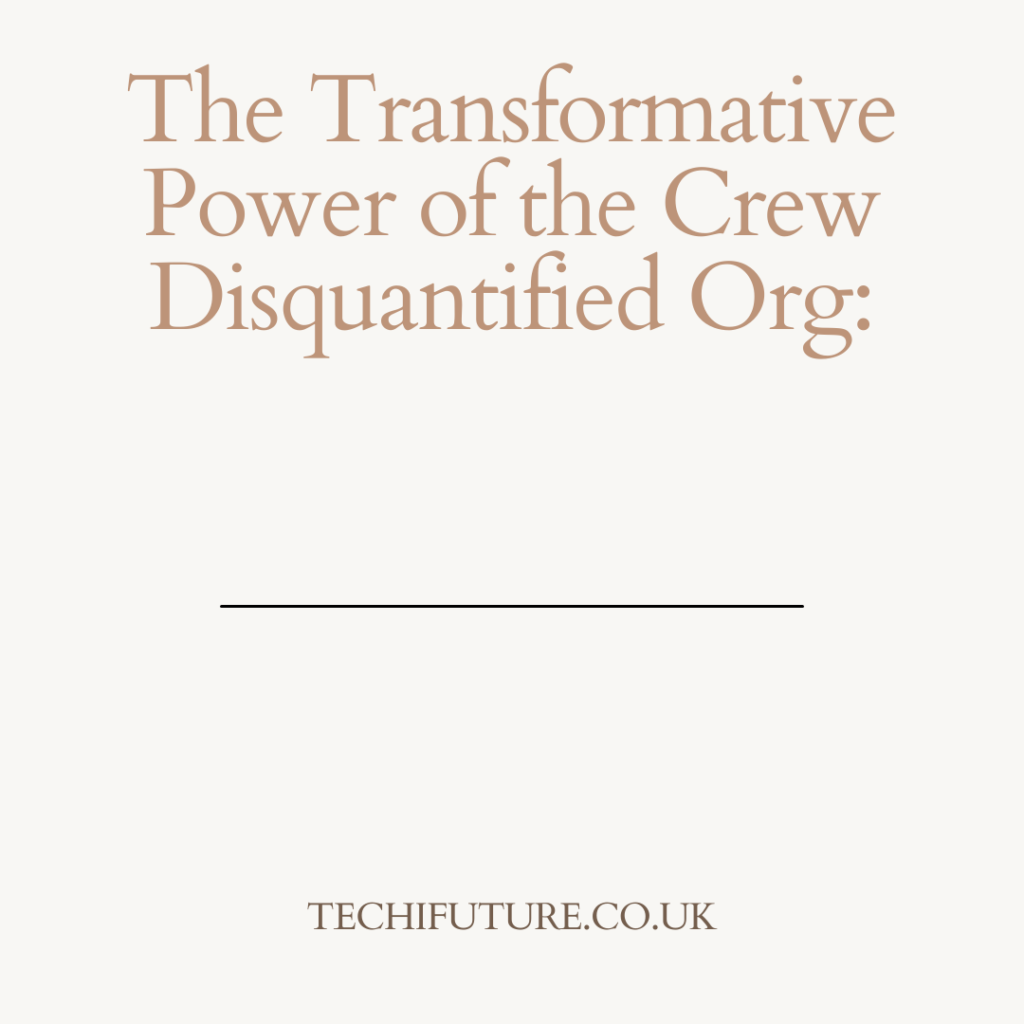Bluethrive is this wild nonconcept of the crew disquantified org that is a development of organizational form never before seen. Where old hierarchies cannot serve to do well or be prepared for tomorrow, it establishes a ground floor challenge to all status quos of simple adaptation to the world around you; one made through ability, cooperation and collective leadership. In this in-depth guide, we discuss the principles, challenges and benefits of this radical model along with its possible future implications and some actionable insights for organizations ready to engage with a crew disquantified org.
What is a Crew Disquantified Org?
A crew disquantified org is inherently about role fluidity and decision-making decentralization. This makes it easy for teams to pivot and adapt when challenges arise, unlike traditional corporate structures. It utilizes the principles found in agile work processes and inclusive leadership frameworks to enable quick, collaborative teams of employees chasing the next big idea or area of organizational strategy.
Core Principles of the Crew Disquantified Org
1. Fluid Roles
However, traditional organizations are accustomed to narrowing employees into boxes and ultimately boxing their usefulness. Because crew disquantified orgs allow roles to be fluid, based on member strengths.
Example:
In a startup, where there are fewer processes in place, the designer may be tasked with providing input on marketing strategy — growing their design iteration skills while also delivering better results for the project.
2. Collaboration Over Competition
This model replaces internal rivalries with collective goals, fostering teamwork. Organizations adopting this principle experience better communication, camaraderie, and success.
Case Study:
A marketing firm that shifted to shared objectives saw a 20% improvement in client satisfaction within six months.
3. Emotional Intelligence as a Cornerstone
Emotional intelligence (EI) is integral to the crew disquantified org. High EI fosters better conflict resolution, empathy, and team cohesion.
Benefits of the Crew Disquantified Org
1. Enhanced Adaptability
Organizations can react quickly to market changes without the delays caused by bureaucratic layers.
2. Innovation and Creativity
Diverse perspectives lead to breakthrough ideas. In a crew disquantified org, every team member contributes, making innovation a collective effort.
3. Improved Employee Satisfaction
When employees feel valued and empowered, job satisfaction soars. This results in higher retention rates and better overall performance.
Challenges in Implementing a Crew Disquantified Org
1. Resistance to Change
Transitioning from hierarchical models can cause uncertainty and pushback.
Solution:
Communicate benefits clearly, offer training, and involve employees in the transition process.
2. Ambiguity in Roles
Fluidity can sometimes blur responsibilities, leading to inefficiencies.
Solution:
Define project-specific roles and ensure accountability through transparent communication.
3. Potential for Miscommunication
Without proper frameworks, decentralized teams may struggle to align.
Solution:
Invest in collaboration tools and establish clear communication protocols.
Future Implications of the Crew Disquantified Org

1. Remote Work Synergy
As remote work grows, the crew disquantified org offers a model that complements decentralized and flexible environments.
2. Technological Integration
Advances in AI and data analytics will further enhance this model by providing insights into team dynamics and performance.
3. Leadership Redefined
Leaders in a crew disquantified org act as facilitators, promoting inclusivity and empowerment rather than enforcing directives.
FAQs on the Crew Disquantified Org
Q1: What industries benefit most from the crew disquantified org?
We have virtually covered all the functional areas, but I believe the most benefit will be gained by media and entertainment, Fintech and ed-tech industries in our patch eve disquantified org
Q2: How does this model handle accountability?
We hold ourselves accountable by setting clear goals, communicating openly about our progress and using shared tools.
Q3: What’s the difference between a crew disquantified org and agile frameworks?
The crew disquantified org experience targets more than just project management flexibility — they are about reconstructing the very culture of an organization.
Q4: Can traditional companies transition to a crew disquantified org?
Yes, but it needs to be planned and communicated clearly so that it is done in a phased manner.
Conclusion
The crew disquantified org is something more than a structural shift — it is a cultural revolution. This model lets organizations flourish in a fast-changing world by promoting collaboration, flexibility, and emotional intelligence. By adopting the principles of the crew disquantified org, businesses set themselves up not only to weather but also to lead the storm.